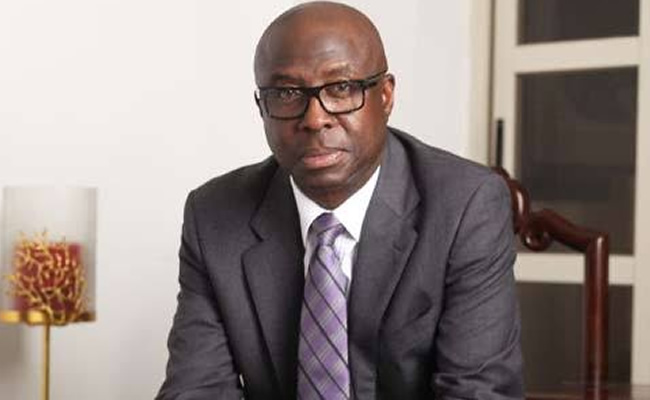In recent days, the Naira has slumped six times against the Dollar in the foreign exchange market.
Business
FG moves to stop foreigners from buying food commodities at farm gates

The Minister of Industry Trade and Investment, Mr. Adeniyi Adebayo, on Tuesday inaugurated an Inter-Ministerial Standing Committee to oversee the implementation of a memo on the “Promotion of Agri-Business in Nigeria through Right Farm Gate Pricing and Ban on Foreigners from Purchasing Agricultural Commodities at the Farm Gates.”
The memo, was earlier approved by the Federal Executive Council (FEC) after it was jointly presented on March 9, by the Ministry of Industry, Trade and Investment and the Federal Ministry of Agriculture and Rural Development.
Adebayo, explained that the move was part of the government’s efforts to provide the enabling environment for the commodity sub-sector to thrive.
The minister said the memo specifically seeks to address challenges impeding the development of the agricultural commodity subsector of the economy, curtail unfair trade malpractices and exploitation of Nigerian farmers by foreigners as well as promote competitive premium pricing as the impetus for increased productivity in the commodity subsector among others.
THISDAY gathered that the practice of middle-men who usually mop up farm produce at source often contributed to rising food inflation as a result – as agricultural products are hoarded to cause artificial scarcity which would then lead to higher food prices.
Also, in the process, farmers are often short-changed by the middle-men who enticed them with quick cash at the source of harvest.
READ ALSO:
- Discos Alert on Nationwide Blackout as TCN Begs Workers to Suspend Planned Strike
- My husband is too lazy, woman tells court
- PDP on self destructive path, Wike warns
These practices had also been attributed to some of the reasons why food prices rarely fall even after the so-called bountiful harvests.
But the latest intervention could slowdown food prices if properly implemented.
The minister, however, decried the exploitation of farmers by foreigners who come to Nigeria to mop up agricultural commodities at the farm gates and in turn offer farmers prices below market value.
Adebayo said, “This situation has indeed led to the failure of many contractual agreements between farmers and indigenous off-takers. It has also affected the production capacity of our local factories due to the fact that foreigners buy off supplies and deprive the factories of required stocks.
“The current practice of direct purchases of agricultural commodities at unfair prices by foreigners at our farm-gates poses serious dangers which include, reduction in farmers’ income, declining productivity in the agricultural sector, unemployment and insecurity.”
He added, “A number of activities have been outlined for implementation and the committee is expected to ensure that they are properly articulated and implemented for the growth and development of our economy.”
The committee would also facilitate the establishment of enforcement organs in the states and local governments, and facilitate the signing of Executive Order by Mr. President, specifying penalties and fines for violators.
It will further liaise with the state governments for the establishment of commodity aggregation centers for export in some strategic locations nationwide and, carry out periodic assessments (quarterly) on the implementation.
However, the Chairman of the Committee, Mr. Suleman Audu, expressed the readiness and willingness of the body to provide the required leadership and coordination to ensure the efficient implementation of its mandate.
Business
BDCs blame peer-to-peer Binance, others for naira fall

BDCs blame peer-to-peer Binance, others for naira fall
The president of the Association of Bureau De Change Operators of Nigeria, BDCs, Aminu Gwadabe, says BDC operators are committed to preventing speculators from attacking the naira.
Mr. Gwadabe said this in an interview on Wednesday in Abuja.
The Association of Bureau De Change Operators of Nigeria, as a self-regulatory body, has platforms to check the excesses of BDC operators, he noted.
“We have inaugurated state chapters whereby we can have a database of participants in the forex market. This is for the Financial Action Task Force (FATF) to understand this market and to know the participants; give them a simple registration,” he said.
Mr. Gwadabe said that the foreign exchange market needed a kind of harmonisation, centralization, and KYC to identify all business participants.
“This will enable the CBN to track other players in the market other than the BDCs and their levels of involvement. The BDCs is collaborating with the regulatory authorities for physical verification of offices using technology.
READ ALSO:
- MTN, Airtel, others set to increase call, data tarrif
- Netizens mock prophet who prophesied world will end today
- Bullying: Tacha accuses Nigerians of ‘selective outrage’
“We want to balance international obligations with our own objectives. International obligations are templates that have been built without our input. We are coming up with our own template to balance it. We have seen some illegal economic behaviour, and the CBN and the security agencies are aware, and I am sure they will nip it in the bud,’’ he added.
He said the recent wave of naira depreciation was of concern to the BDC operators.
Mr. Gwadabe explained, “I am happy that the authorities, and even the BDCs as operators, have identified the peer-to-peer (P2P) platform. P2P is a platform like Binance where speculators use the dollar to buy USDT, a stablecoin that is pegged at one to the dollar.
“As long as Binance and such other platforms continue to be profitable, the naira will continue to depreciate. There are many of them in the system. Binance has been nipped in the bud, but there are still many. They are online platforms with no registration or restrictions.”
Mr. Gwadabe said that the CBN and the security agencies were already aware of the antics of the platforms. According to him, they are more of an illegal form of economic behaviour, and the people behind them lack patriotism.
“People have turned the dollar into an asset—a commodity of trade—which is why those platforms continue to thrive. We have seen where people are buying dollars into their domiciliary accounts to finance these schemes. A lot of millions of dollars are going out of the system. It is one USD to one USDT. The market can be liquid.
“Binance alone has four billion dollars of liquidity and more than two million transactions. Most of them source money to finance their transactions on the open market, and that is one of the reasons why the naira is depreciating,’’ he said.
BDCs blame peer-to-peer Binance, others for naira fall
Business
MTN, Airtel, others set to increase call, data tarrif

MTN, Airtel, others set to increase call, data tarrif
Telecommunications companies operating in Nigeria have begun moves that will see to an increase in call tariff in the country.
The companies which include Glo, MTN, Airtel and 9Mobile are asking the federal government to facilitate constructive dialogue in the industry.
According to the telcos, the current price control mechanism is not in tandem with the economic realities, thus seeking the government’s intervention in order to address pricing challenges.
The four telecommunications giants said they were the only ones that have not reviewed their prices which threaten the industry’s sustainability and possibly erodes investors’ confidence.
They made this known in a joint statement by the Association of Licensed Telecommunications Operators of Nigeria (ALTON) and Association of Telecommunication Companies of Nigeria (ATCON) on Thursday.
According to the statement signed by ALTON Chairman, Mr Gbenga Adebayo, and ATCON President, Mr Tony Emoekpere, there has not been a general service pricing framework upward in the past 11 years.
They attributed the non-increment to regulatory constraints despite the adverse economic hardship.
READ ALSO:
- Judge absent in Fayose N6.9bn fraud case, matter adjourned to July 1
- In fresh attack, bandits invade two Zamfara communities, kill three, abduct many
- Unite against Israel to better humanity, Fani-Kayode task Christians, Muslims
They said: “For a fully liberalised and deregulated sector, the current price control mechanism, which is not aligned with economic realities, threatens the industry’s sustainability and can erode investors’ confidence.
“Despite the adverse economic headwinds, the telecommunications industry remains the only industry yet to review its general service pricing framework upward in the last 11 years, primarily due to regulatory constraints.
“Government needs to facilitate a constructive dialogue with industry stakeholders to address pricing challenges and establish a framework that balances consumers’ affordability with operators’ financial viability.”
The telcos also expressed concerns on the worsening security challenges affecting the productivity of the services provided, urging the federal government come up with measures to tackle the menace.
“Telecom infrastructure undisputedly plays a pivotal role in Nigeria’s national security and socioeconomic growth, especially as the country currently contends with multiple security challenges that require urgent and immediate actions in response to these threats.
“Attacks on cell towers, fibre optic cables, and other critical assets disrupt telecommunications services and result in significant financial losses for operators. We urge the government to prioritise the security of telecommunications infrastructure and collaborate with law enforcement agencies to enhance protection measures and combat vandalism and sabotage effectively.
“The industry also requires substantial investments in network expansion, maintenance, and technology upgrades,” they said.
MTN, Airtel, others set to increase call, data tarrif
Business
Naira continues fall against dollar despite CBN $10,000 to BDCs

Naira continues fall against dollar despite CBN $10,000 to BDCs
The Naira has failed to appreciate against the US dollar at the foreign exchange market despite the Central Bank of Nigeria’s recent additional release of $10,000 to Bureau De change operators.
FMDQ data showed that the Naira recorded another drop to N1308.52 per Dollar on Wednesday compared to N1,300.15 exchanged on Tuesday.
On a day-to-day basis, this represents an N8.37 drop from N1,300.15 per Dollar it traded on Tuesday.
In the parallel market section, the Naira was sold at between N1,250 and N1,300 on Wednesday from N1230 on Tuesday.
READ ALSO:
- Worry as long queues return to Abuja filling stations, five other states
- Iranian rapper sentenced to death for supporting anti-hijab protests
- Reno’s challenge: Peter Obi admits he didn’t build any school in Anambra, gives reasons
The development comes despite the Central Bank of Nigeria releasing 10,000 dollars each to BDC at N1,021 to a dollar with a caveat to sell at most 1.5 per cent above the bought price.
This is the third recent intervention for BDCs amid the bank’s effort to defend the Naira.
However, despite the FX rate record, the official window rate still surpassed the parallel market by N8.52.
Meanwhile, on Wednesday, the National President of the Association of Bureau De Change Operators of Nigeria, Aminu Gwadabe, blamed peer-to-peer cryptocurrency platforms like Binance for the recent depreciation of the Naira against the Dollar in the foreign exchange market.
-

 Education5 days ago
Education5 days agoWhy we charge N42m fees for primary school pupils — Charterhouse Lagos
-

 Auto6 days ago
Auto6 days agoWe expect massive roll-outs of Nigeria-made cars by December 2024 – Minister
-

 metro5 days ago
metro5 days agoJUST IN : Borrow pit collapses, kills seven Qur’anic school pupils
-

 News5 days ago
News5 days agoWe’re not part of Yoruba Nation agitation, says MKO Abiola family
-

 metro4 days ago
metro4 days agoHow gunmen killed Babcock university lecturer, abducted two – Police
-

 Politics5 days ago
Politics5 days agoOndo APC primary: Ododo, gov aspirant in open confrontation
-

 metro7 days ago
metro7 days agoEdo commissioner accused of disrespect loses chieftaincy title
-

 News7 days ago
News7 days agoIGP orders withdrawal of police attached to Yahaya Bello






















